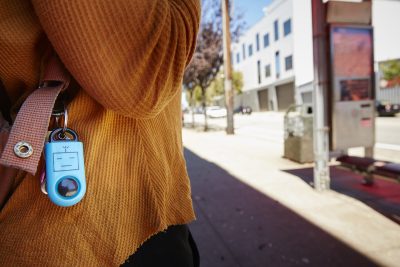
While the Boston University Emergency Alert System gives students a heads-up on crime and threats in the city, blue-light systems, liaisons and transportation opportunities add to the effort of keeping campus safe. However, even with all the layers, student fear remains and accidents still happen.
ROBOCOPP, a company that creates personal safety devices, is working to alleviate fear at the push of a button, or, literally speaking, the pull of a pin with the ROBORanger, according to a press release.
“One rigorous academic study documents that 68% of criminals leave a scene completely empty-handed when an alarm is activated,” ROBOCOPP’s Public Relations Director Jill Turner stated in a press release from Tuesday. “If we can decrease the risk of a mugging or kidnapping by 68%, we are on the right track.”
The ROBORanger is preceded by the company’s first “SOS” device: the Sound Grenade, according to the website. On Tuesday, the new technology will be introduced to the market of personal safety, according to a press release.
When the person pulls the pin, it sounds the built-in 130-decibel alarm while alerting the police of their location. At the same time, it sends a text alert to family and friends. The 3G signal of the device gives a distress call both for prevention and response, according to the press release.
“The ROBORanger works right off the shelf,” said Sam Mansen, the CEO of ROBOCOPP. “You could pick it up off the shelf, give it to your grandmother and say, ‘Hey, pull this pin if you need help.’”
The device has been engineered to attract attention and dissuade criminals. It is also connected to a 24/7 dispatch center, Mansen said.
Unlike many other technological devices, the ROBORanger does not depend on connecting to a smart phone; Mansen said the device is also resistant to battery drainage and being out of range.
This choice was inspired by the simple fact that people often leave places without any battery left, according to the Mansen.
“Is it worth risking your life because of a dead cell phone battery?” Mansen said, explaining that the device will complement smart phones.
“We think this will be really popular with college students and their parents will love this lot,” Turner said. “However, anyone can use it. I can picture anyone as young as a child being able to use it and someone as old as an elderly person.”
While the main goal of the device is to deter criminals, it can be used in a variety of scenarios. Customers may use this technology on their walk home, on a hike by themselves or even when traveling.
“People put alarms on their homes and cars, but not themselves or their children,” Mansen said in the press release. “Why not? Life is much more valuable, I think.”
As a result of pepper spray’s illegality in some states, both Turner and Mansen expressed that they think the ROBORanger will a popular, non-violent option.
Both Boston University students and professors alike said they think ROBORanger has the possibility to work, but question the resource’s projected popularity.
“I think BU’s campus is relatively safe,” said Alexa Pata, a senior in the College of Arts and Sciences. “I don’t know if I ever feel really unsafe, but this would definitely help [me] feel more secure, especially freshman or sophomores who don’t know where the blue lights are.”
The nonviolent aspect of the device also has appeal to people.
“There’s no reason to not feel safer,” said Karen Robbins, a writing professor in the College of Arts and Sciences. “This is a good option for someone who doesn’t want to be violent.”
However, Robbins also questioned the device’s applicability and viability in a college setting.
“Design-wise, I wonder if it’s easy to pull,” Robbins said. “If you have your keys in your bag, is it going to pull. Or by accident you’re just playing with it or your baby sister gets it. That’s the only thing I worried about.”
Additionally, ROBORanger may not be as effective for city schools, Robbins said.
“I don’t think loud noises really attract people. In a city, there is a lot of that,” she said. “I wonder if loud noises attract if it’s 2 a.m. and you’re the only one on the street. I’m not sure it’s really going to help.”
Whether or not the trend catches on, ROBOCOPP is another company that adds to the existent efforts at college campuses, large or small, rural or urban.
“To me,” Robbins said, “it seems if you’re smart, it doesn’t seem to be a problem to be safe.”










